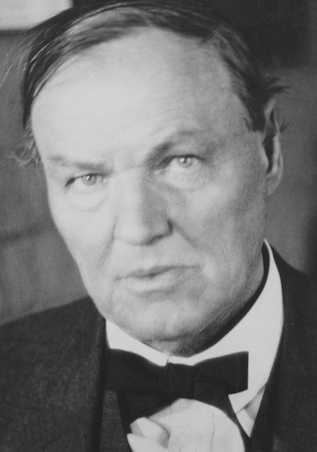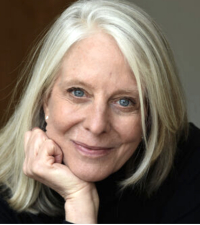April 18
Clarence Darrow

On this date in 1857, Clarence Darrow, later dubbed “Attorney for the Damned” and “the Great Defender,” was born in Farmdale, Ohio. For a time he lived in a home that had served as a stop on the Underground Railroad. His father was known as the “village infidel.” Darrow attended the University of Michigan Law School for one year, then passed the bar in 1878 and moved to Chicago. There he joined protests against the trumped-up charges against four radicals accused in the Haymarket Riot case.
Darrow became corporate counsel for the city of Chicago, then counsel for the Chicago & North Western Railway. He quit this lucrative post when he could no longer defend their treatment of injured workers, then went on to defend without pay socialist striker Eugene V. Debs. In 1907, Darrow successfully defended labor activist “Big Bill” Haywood, charged with assassinating a former governor. His passionate denunciation of the death penalty prompted him to defend the famous killers, Loeb and Leopold, who received life sentences in 1924.
His most celebrated case was the Scopes Trial, defending teacher John Scopes in Dayton, Tenn., who was charged with the crime of teaching evolution in the public schools. Darrow’s brilliant cross-examination of prosecuting attorney William Jennings Bryan lives on in legal history. During the trial, Darrow said: “I do not consider it an insult, but rather a compliment to be called an agnostic. I do not pretend to know where many ignorant men are sure — that is all that agnosticism means.”
Darrow wrote many freethought articles and edited a freethought collection. His two appealing autobiographies are The Story of My Life (1932), containing his plainspoken views on religion, and Farmington (1932). He also wrote Resist Not Evil (1902), An Eye for An Eye (1905), and Crime, Its Causes and Treatments (1925). His freethought writings are collected into Why I Am an Agnostic and Other Essays. He told The New York Times, “Religion is the belief in future life and in God. I don’t believe in either.” (April 19, 1936)
He married Jessie Ohl in 1880 and they had a son, Paul Edward, in 1883 before divorcing in 1897. Darrow married Ruby Hammerstrom, a journalist 16 years his junior, in 1903. He died at age 80 of heart disease. (D. 1938)
PHOTO: Darrow in 1922.
"I don’t believe in God because I don’t believe in Mother Goose."
— Darrow, 1930 speech, Toronto, Canada
Bonnie Garmus

On this date in 1957, author Bonnie Garmus was born in Riverside, Calif., the youngest of four daughters. Her mother was a nurse and homemaker, and her father was an entomologist who traveled a lot for his work. Her initial acclaim stemmed from her bestselling debut novel “Lessons in Chemistry” in 2022.
The book was dedicated to her mother for the years spent raising her daughters before returning to nursing. Garmus grew up mainly in Riverside: “I was raised in the church, my parents were very active members, but when I was aged eight I started questioning it. I was a huge reader and I didn’t think the Bible stories were very good compared to the Greek, Norse or Native American myths.” (Daily Mail, May 8, 2022)
After two years at Kenyon College in Ohio, she transferred to and graduated from the University of California at Santa Cruz. She worked for a publisher of science textbooks and later as a technical writer of computer manuals before moving to Seattle to work as a copywriter focusing on science and technology.
Garmus worked on “Lessons in Chemistry” for five years. She and her husband David, a mathematician and astrophysicist by training who worked for Google before starting his own company, moved from Seattle to Zürich. David was working on a Ph.D. in philosophy when they started dating. His dissertation was on Schopenhauer. Garmus was also writing speeches, ad campaigns, video scripts and presentations as a freelance copywriter.
“Lessons,” set in Southern California in the early 1960s, tells the story of feminist protagonist Elizabeth Zott, who becomes a popular cooking show host after losing her job as a research chemist. “Elizabeth initiates a quiet revolution, using her platform to speak directly to millions of housewives about their own capacity for change. Garmus’s great skill here is to create a richly comic novel around a character who is entirely deadpan, and to whom some pretty dreadful things happen.” (The Guardian, April 19, 2022)
Garmus said her goal was “to create a character who speaks for anyone who’s been held back, disbelieved, maligned, or underestimated. But I also wanted to create a character who refuses to put up with it. Elizabeth Zott has a disregard for societal limits. She rejects religion, stereotypes, racism, sexism, elitism, and food that comes in cans.” (Entertainment Weekly, Oct. 20, 2021)
“I’m an atheist, Mr. Roth,” Zott says in the book while sighing heavily. “Actually, a humanist. But I have to admit, some days the human race makes me sick.”
“I felt like I was writing my own role model, and so she came easily,” Garmus recalled. (New York Times, Nov. 16, 2022) Reiterating that in a 2023 interview with NPR/WBUR Boston, she said: “When I was writing Elizabeth Zott, I was really writing my own role model, someone I wanted to look up to at that time, somebody who knew who she was and understood at a very scientific level that gender politics are not rational.”
Her agent Felicity Blunt, who is married to actor Stanley Tucci and is actress Emily Blunt’s sister, said what first struck her about Garmus’ writing was “It made me laugh, I mean immediately. I laughed on reading the first paragraph.” (Curtis Brown Creative, Oct. 22, 2020)
Brie Larson played Zott in an eight-episode series of “Lessons in Chemistry” on Apple TV+ that started streaming in October 2023. As of this writing, the book has been published in 42 languages and Garmus and her husband live in London. They have two grown daughters, Sophie and Zoë, both adopted from China.
Garmus doesn’t even like cooking: “For me, it’s a chore. I love people who are good at cooking, because I think it’s a special talent.” (The Guardian, Dec. 16, 2023)
For her “plain speaking” on the shortcomings of religion by public figures, Garmus was a 2024 recipient of FFRF’s Emperor Has No Clothes Award.
“I'm a humanist. I'm a big fan of Richard Dawkins.”
— Daily Mail interview (May 28, 2022)
